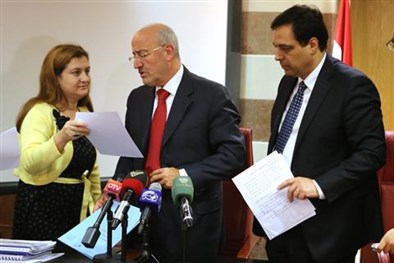Source: http://www.dailystar.com.lb
Author: Rayane Abou Jaoude
BEIRUT: Renovations are set to begin immediately on public schools across Lebanon to address what caretaker Education Minister Hassan Diab called the "threat to public safety" posed by severely dilapidated buildings.
The schools have been completely evacuated, with the students divided into groups and taught their classes in apartments rented out by the ministry until the works can be completed, said Diab. He made the comments during a joint news conference with caretaker Public Works and Transport Minister Ghazi Aridi at the Education Ministry Thursday.
Diab said the Finance Ministry had recently transferred the first installment of the LL7.5 billion allocated for public schools in dire need of renovation, which will be carried out by a contractor overseen by the Public Works Ministry.
He stressed that the schools were not under threat of collapsing immediately, but were nevertheless in need of serious fortification.
Diab welcomed the launch of the initiative, but lamented that it had taken "two years of sounding the alarm in Cabinet" for the government to actually take action.
A study presented to the ministers two years ago identified 67 schools in need of rehabilitation for a budget of LL30 billion.
The Cabinet asked the list be shortened and priority be given to the schools in the worst condition, leading to the current list of 46 with a budget of LL7.5 billion.
Due to the gradual transfer of funds, the schools have been prioritized according to their condition.
The most dire cases were schools in Batloun, Kfar Faqoud, Aramoun, and Hawd al-Wilaya in the Aley, Chouf and Beirut districts.
A second transfer of LL2 billion was recently announced, which will go toward the next nine schools on the priority list of those considered "dangerous to the public."
More schools are being studied, and a third payment is awaited in order to begin rehabilitation as soon as possible on the other 23.
According to Aridi, the restoration was originally intended to begin in the summer season while students were still on vacation, but in light of the "current situation of the government," the project had to be postponed.
Renovations may take up to eight months to be completed, he said, depending on the needs of the school and the danger posed to students.
"We have aimed since the very beginning ... to neutralize education and keep it away from political and security-related conflicts in the country," Diab said.
"We repeat and we raise our voice about the necessity of prioritizing education as something which embraces the sons and daughters of Lebanon from all areas, sects, political inclinations and ideologies."
He added that it would be unacceptable to postpone the project due to political considerations, particularly if it affected the safety of the schools and posed any danger to the students and the public.
"We raise our voice about the need for the rest of the allocated funds to be transferred with no delays," Diab said.
Aridi stressed that while the Public Works and Transport Ministry was overseeing the rehabilitation of the schools, it would only address aspects which posed a threat to public safety.
He went on to acknowledge that other parts of the schools, although not urgent, required fixing.
"I know that a large number of schools in Lebanon require rehabilitation, but to be clear, we are implementing only what was given to us by the Cabinet," he said.
"We are fortifying, not developing," Aridi added, noting that schools across Lebanon needed development in order to be more "appropriate" for students, teachers, and the overall education system in Lebanon.














